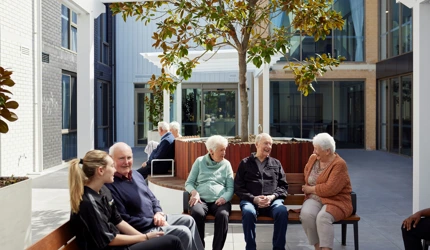
When someone you love moves into residential aged care, it’s easy to feel overwhelmed and uncertain about how it is all going to work out.
Marion Urfig says she will never forget when her husband of more than 50 years moved into residential aged care at Brightwater Inglewood.
“When Meir first went in, it was scary for us all. The unknown is always scary,” she says.
For Marion, the best way to deal with the uncertainty was to follow a consistent routine. She visits Meir most mornings, bringing fresh fruit and taking him for a walk around the grounds. She says it’s helped them both adjust to this new chapter of their lives together.
“I still have a husband, and I'm still married, just in a different way,” she says.
Anne-Therese Pratt is the Service Manager at Brightwater’s residential aged care home, The Oaks in Waikiki, and agrees it can be a challenging time.
"It's not easy on anyone. The new resident is feeling the loss of their independence.
Families are feeling the guilt and loss,” she says.
There are many ways to help.
Anne-Therese says support from family is critical to how well people settle into aged care. This can begin even before a loved one moves into their new home.
“I tell families they can set up the room prior to admission, with whatever their loved one will recognise or need, such as furniture, bedding and photos. Then when they walk in, they see familiar things rather than a blank slate. It all helps,” she says.
Anne-Therese says that it is normal for families to feel apprehension and even guilt, but that can be alleviated by continuing to be part of your loved one’s life.
“Visit as often as you want. Come at different times so you can see what happens at different times of the day,” she says.
“If you want to take your family member out, you should; if there is a special event coming up, then include them. We also encourage people to join their loved one for a meal or to join in with the activities program.”
Patience and understanding are key.
Anne-Therese says it’s important to understand that everyone is different.
“Some people thrive on knowing what is going to happen next, so a routine is a great idea for them. But for others, it becomes an added stressor as they fixate on the family routine and struggle to settle into living in care,” she says. “Families know their dynamics best, so we work with them to ensure that everyone settles and has their care needs met.”
It can take time for people to settle into the home, and Anne-Therese advises families not to worry too much in the first 6-8 weeks.
“It helps to remind yourself that your loved one is in a safe place where they are being cared for by an experienced team,” she says.
Can we help?
If you have any questions about residential care, give our Welcome Team a call on 1300 223 968 or email [email protected]



